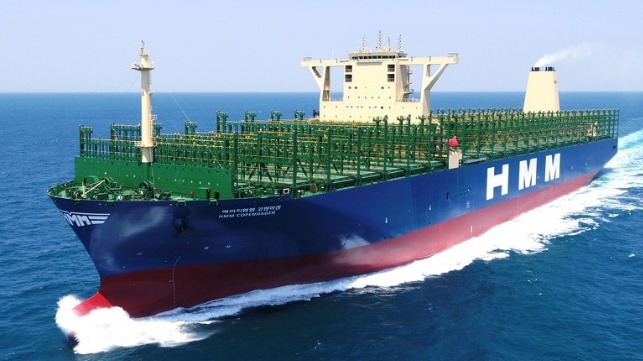
BY THE MARITIME EXECUTIVE 10-06-2020 02:32:34
The race to develop commercial designs for ships fueled with ammonia is continuing to show progress with the South Korean shipbuilders taking steps forward in the field. In the latest development, class society LR has granted an Approval in Principle (AiP) to Daewoo Shipbuilding & Marine Engineering (DSME) and MAN Energy Solutions for an ammonia-fueled 23,000 TEU ultra-large containership design.
This is the first AiP awarded in Korea for an ammonia-fueled ultra-large container ship design, and a key milestone in the first phase of the joint development project underway with Daewoo and MAN. Last year, LR awarded a similar AiP to Dalian Shipbuilding in China, which is also working with MAN for a large containership to be fueled by ammonia. Among the South Korean shipbuilders, both Samsung Heavy Industries and Hyundai Mipo Dockyard have also recently received AiPs for their ammonia development projects focused on tanker designs.
As part of this joint development project, DSME generated the basic design of the ammonia propulsion system for the ultra-large containership. “Working with Lloyd’s Register and MAN Energy Solutions, DSME has developed the zero-carbon ammonia (NH3) fueled container ship, a more complex design than that of other ship types because the ammonia fuel tank and much of the fuel facility and safety equipment is installed in an enclosed space. To maximize safety and eliminate risks, we carried out HAZID and HAZOP with LR and MAN, based on DSME’s developed detail design,” said Odin Kwon, Vice President / CTO at DSME “The successful results from the joint AiP can easily be applied to other types of vessels such as tankers, bulk carriers, and gas carriers. We now just await the delivery of the ammonia-fueled engine from MAN Energy Solutions.”
In its role in the project, MAN Energy Solutions was responsible for the development and specifications of the ammonia dual-fuel propulsion engine. “Ammonia is a fuel with a lot of potential and this containership concept is yet another important step towards decarbonizing the marine market,” said Bjarne Foldager, Senior Vice President and Head of Two-Stroke Business at MAN Energy Solutions. “MAN Energy Solutions’ strategy is to cooperate with external partners where possible to develop sustainable solutions. I believe that this collaboration with Lloyd’s Register and DSME is just the kind of environmental leadership that the market requires.”
LR’s role in the joint development project with Daewoo and MAN was to review the suitability and risks of the design which involved a hazard identification (HAZID) workshop, a hazard & operability analysis (HAZOP) workshop, and a design review following the Approval of Risk-Based Design (ARBD) process, which led to Approval in Principle.
“With the maritime industry focused on zero-carbon fuel options, Lloyd’s Register in joint partnership with Daewoo Shipbuilding & Marine Engineering and MAN Energy Solutions has granted Approval in Principle for a dual-fuel ammonia engine – a first for an ultra-large containership in Korea and another important step in this decade where concerted action is required to address shipping’s decarbonization. We congratulate the teams involved with this achievement,” said Jin-Tae Lee, LR Marine and Offshore President for North East Asia.
According to the partners, the AiP certification was the first phase of the JDP. The second phase will involve further development of the design for meeting market demand in terms of commercial viability as well as technical and safety maturity.
The project’s goal is by 2025 to have commercialized the ammonia-fueled 23,000 TEU ultra-large container ship design.
source: www.maritime-executive.com


